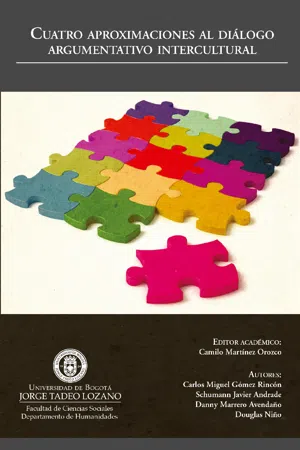
Cuatro aproximaciones al diálogo argumentativo intercultural
- English
- PDF
- Available on iOS & Android
Cuatro aproximaciones al diálogo argumentativo intercultural
About this book
El conjunto de reflexiones que se presenta en este trabajo es producto de los esfuerzos adelantados a lo largo del proyecto de investigación sobre diálogo argumentativo intercultural desarrollado dentro del grupo de investigación «Mente, Lenguaje y Sociedad» del Departamento de Humanidades de la Universidad Jorge Tadeo Lozano. Todas estas reflexiones tienen en común su objeto, pero lo abordan desde perspectivas diferentes, lo que hace de este conjunto algo variopinto. Ejemplo de ello son las aproximaciones que ofrecen Gómez, por una parte, y Niño, por otra: el primero aborda el problema del diálogo argumentativo intercultural desde la especificidad del diálogo interreligioso, mientras el segundo lo hace a partir de un enfoque semiótico; mientras el primero trabaja un diálogo argumentativo intercultural particular, la reflexión del segundo pretende abarcar cualquier diálogo argumentativo intercultural. Los trabajos de Andrade y Marrero comparten con el de Gómez este segundo rasgo: cada uno de ellos se ocupa de un diálogo argumentativo intercultural particular; Andrade trabaja el encuentro dialógico entre una vertiente del cristianismo y la ciencia médica moderna, mientras Marrero aborda el diálogo entre la justicia ordinaria de familia y las culturas indígenas.
Frequently asked questions
- Essential is ideal for learners and professionals who enjoy exploring a wide range of subjects. Access the Essential Library with 800,000+ trusted titles and best-sellers across business, personal growth, and the humanities. Includes unlimited reading time and Standard Read Aloud voice.
- Complete: Perfect for advanced learners and researchers needing full, unrestricted access. Unlock 1.4M+ books across hundreds of subjects, including academic and specialized titles. The Complete Plan also includes advanced features like Premium Read Aloud and Research Assistant.
Please note we cannot support devices running on iOS 13 and Android 7 or earlier. Learn more about using the app.
Information
Table of contents
- Contenido
- Presentación
- La dimensión argumentativa del diálogo interreligioso: problemas y propuestas
- Argumentación, formas de vida y entimemas
- ¿Monólogo judicial o diálogo intercultural? Dos visiones de la argumentación jurídica en casos de conflicto intercultural
- Agentes y circunstancias. Consideraciones en torno a factores epistémicos y fiduciarios en la argumentación intercultural